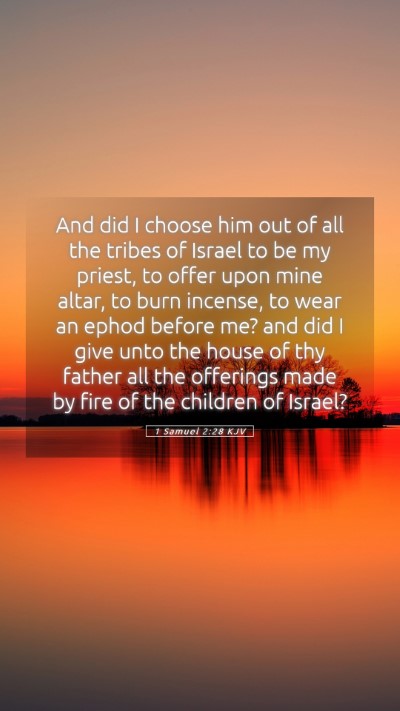Understanding 1 Samuel 2:28
Verse: 1 Samuel 2:28
In this verse, God speaks to Eli about his family, particularly emphasizing the special role that they have played in the service of the Lord's sanctuary. The verse is significant in highlighting the themes of divine calling, family responsibility, and the consequences of failing to honor God.
Bible Verse Commentary Overview
1 Samuel 2:28 serves as a pivotal context in the examination of Eli’s priestly lineage and the accountability inherent in that position. Through a combination of insights from public domain commentaries, we explore the meaning and implications of this verse.
Insights from Matthew Henry
Matthew Henry emphasizes that God called Eli and his sons to a distinguished role among His people as priests. This calling illustrates the seriousness of service within the tabernacle and the expectations placed upon those in leadership. Henry notes that the failure of Eli to restrain his sons' sinful behavior highlights the consequences of neglecting one’s responsibilities, leading to a failure in spiritual duties.
Insights from Albert Barnes
Albert Barnes expands on the historical context, noting Eli’s sons, Hophni and Phinehas, acted wickedly in their priestly roles. Barnes emphasizes the principle that those who serve God must do so with integrity and reverence. The verse serves as a warning to future generations about the importance of honoring the divine call and the potential repercussions of failing to do so.
Insights from Adam Clarke
Adam Clarke provides a broader theological perspective, suggesting that this verse is indicative of God’s choice and grace. He explains that while Eli and his family were chosen, their actions led to their rejection. Clarke points out the importance of faithfulness in fulfilling one’s religious duties, and how this principle can apply to contemporary believers in their own spiritual lives.
Meaning and Application
The implications of 1 Samuel 2:28 reach beyond its immediate context, urging individuals to reflect on their responsibilities in serving God. The verse serves as a reminder to respond to divine calls sincerely and to hold oneself accountable within one's familial and community contexts.
Key Themes
- Divine Calling: Recognizing one's divine appointment and responsibilities.
- Family Responsibility: The importance of nurturing faith and righteousness within one’s family.
- Consequences of Neglect: Understanding that failing to uphold God’s standards can lead to serious repercussions.
Related Cross References
- 1 Samuel 2:12-17 - Eli's sons' misconduct.
- 1 Samuel 2:30 - The judgment against Eli's house.
- 1 Peter 5:1-4 - Exhortation to shepherds in the church.
Conclusion
1 Samuel 2:28 encapsulates the essence of divine expectation from those chosen to serve. It prompts deeper Bible study insights into the character of God and the vital role of personal integrity in ministry. For anyone engaging in Bible verse interpretations or seeking a wider understanding of Scripture, this verse provides foundational lessons in accountability, leadership, and the consequences of disobedience.
To explore further, consider studying this verse along with the surrounding passages for a holistic understanding of its message and implications in relation to biblical leadership and family dynamics.


